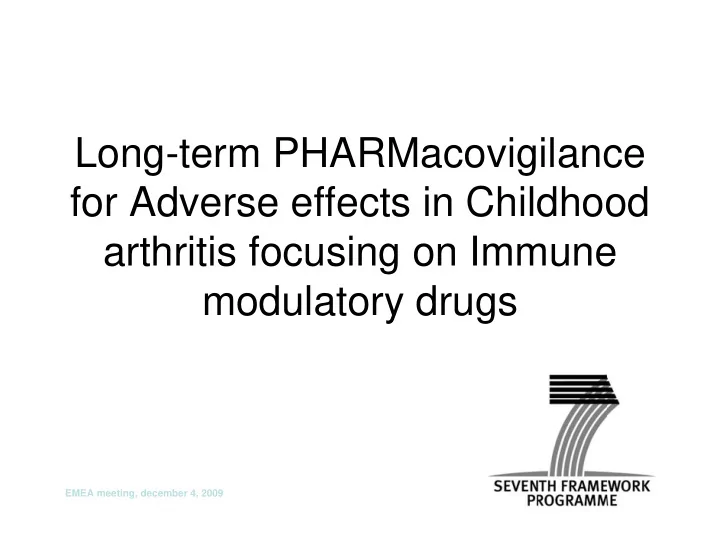

Long-term PHARMacovigilance for Adverse effects in Childhood arthritis focusing on Immune modulatory drugs EMEA meeting, december 4, 2009
A European collaboration between pediatric rheumatology centers regarding long term outcome and pharmacovigilance for biologics used in Juvenile Idiopathic Arthritis a PReS/ Printo project Nico Wulffraat, Utrecht and Nicola Ruperto, Genoa
FDA: ongoing safety review of TNF blockers Types of Pediatric Malignancy Reported to FDA # # Type of Malignancy cases Type of Malignancy cases Hepatosplenic T-cell lymphoma 10 Renal cell carcinoma 1 Non-Hodgkin’s lymphoma 7 Hepatic malignancy 1 Metastatic hepatocellular Hodgkin’s lymphoma 6 cancer 1 Leukemia 6 Malignant mastocytosis 1 Malignant melanoma 3 Neuroblastoma 1 Thyroid cancer 3 Colorectal cancer 1 Basal cell carcinoma 1 Yolk sac tumor 1 Lymphoma and AML 1 Myelodysplasia 1 Leiomyosarcoma 1 Bladder cancer 1 Nephroblastoma 1 11 FDA, June 4th 2008
EMEA statement
EMEA statement (2) • Concern: adverse events (neurological, infections, malignancies) • Plausible biological mechanism: failing immune surveillance • Suitable research methodologies: long- term epidemiological follow-up studies of adverse events; subgroup analysis to study risk factors EMEA, London, 4 august 2009
FDA workshop for a paediatric rheumatology observational strategy” (May 12, 2009). • long term safety of biologics in JIA is lacking. • Detection of rare events via international collaboration between both sides of the Atlantic. • Large scale international pharmacovigilance registries are required. • Support and participation by the pharmaceutical industry is encouraged.
Proposal for an international registry • PHARMACHILD aims to detect, assess and understand long term and short term side effects of the use of biologics by studying the pharmacovigilance in a large international cohort of patients with Juvenile Idiopathic Arthritis (children and young adults) in order to support regulatory decisions on marketing authorizations for these products.
Biologics in children • Increasing numbers of indications since 1999 • Increasing numbers of biologics registered for adults (and some for children) • JIA: most common chronic inflammatory disease treated with biologics • Existing international network of expert pediatric rheumatology centers • Existing collaboration with US/Canada
FP7 grant application pharmacovigilance of biologics in JIA WP No Work package Title Type of Activity Lead participant No Lead participant short name WP1 Data collection, monitoring and statistical analysis RTD 2 Genoa, Italy WP2 Analysis of reported adverse events RTD 5 Manchester, UK WP3 Biomarker analysis RTD 4 Münster, Germany WP4 Synthesis & identification of risk factors RTD 1 Utrecht, NL Consortium Management, assessment of progress and WP5 MGT 1 Utrecht, NL dissemination of results TOTAL RTD = research and technological development; DEM = Demonstration; MGT = Management of the consortium; OTHER = other specific activities
WP1: Large scale epidemiological study • Using existing network of expert pediatric rheumatology centers of PReS and PRINTO and existing national registries • Objective: To built up and enroll children with juvenile idiopathic arthritis (JIA) treated with biologic agents in the PRINTO/PReS web based effectiveness registry. WEB based • Development of concise forms • Monitoring • Statistical analysis • Reported adverse events will be transferred to WP2
Network of EU registries for biologics in JIA Country Abbreviation Registry BSPAR Biologics & New Drugs Registry (JIA) BSPAR-BNDR and Extended Biologics Study (JIA) United Kingdom BSRBR British Society of Rheumatology Biologics Register (RA and adults with JIA who received biologics in adulthood) RABBIT Etanercept German long-term observation of biologics in RA register Germany Register for children with JIA, receiving etanercept or MTX JuMBO Register for adults with JIA who received etanercept or MTX in childhood The Netherlands ABC-Register Arthritis and Biologics in Children Finland - Registry of JIA patients treated with anti-TNF Czech Republic - Registry of JIA patients treated with anti-TNF Spain - National Etanercept registry for JIA (Valencia, Spain) Sweden - Registry of JIA patients treated with anti-TNF Italy IPERN registry Registry of JIA patients treated with anti-TNF France CEMARA Platform for reference centers on Juvenile Arthritis Switzerland - Registry of JIA patients treated with anti-TNF
WP2: analysis of adverse events • Objective: To ensure validated robust analysis of the occurrence and risk of observed serious adverse events, and in particular serious infections, malignancy and inflammatory gastrointestinal diseases, in children receiving biologics for JIA.
WP2, methodology • Using MedDRA classification • Expert panels: – Oncology – Infectious diseases – Gastroenterology (link with IBD registry) • Analysis of new (prospective) cases and retrospective cases • If possible obtain biological specimen. • Risk assessment
WP3: analysis of immunesurveillance • objective: To analyze immune surveillance mechanisms in a cohort of JIA patients under treatment with immuno-modulatory drugs and to identify a panel of risk factors for undesirable outcomes such as adverse events in JIA.
WP3, methodology • Create a cohort of JIA patients before and under biologic treatment. • Document clinical response parameters • Obtain biological materials at intervals for – Testing for response parameters – Immune regulation mechanisms, cytokine profiles – Immuno surveillance: tumor immunology and the role of dendritic cells loaded with tumor antigens
WP4 • Synthesis of results obtained from WP’s • Identification of risk factors
Recommend
More recommend